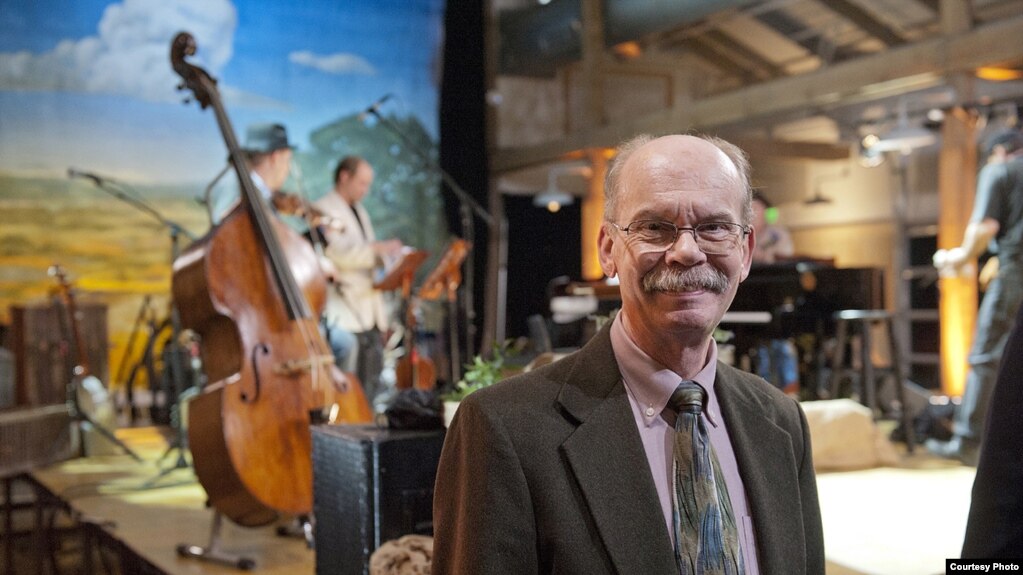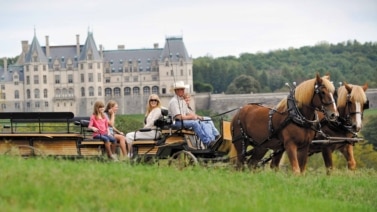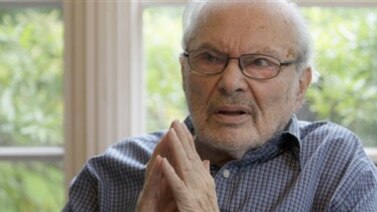
SHIRLEY GRIFFITH: Welcome to THIS IS AMERICA in VOA Special English. I'm Shirley Griffith.
CHRISTOPHER CRUISE: And I'm Christopher Cruise. This week on our program, we talk to author Nell Freudenberger about her new book, "The Newlyweds." And later, we hear some of the music that Laura Ingalls Wilder described in her popular children's books about life on the American frontier.
(MUSIC)
SHIRLEY GRIFFITH: Nell Freudenberger has been writing poems and stories since she was a child growing up in New York. But she says she never expected writing to become her career. Now, she is the author of two novels and a collection of short stories.
Her second novel, "The Newlyweds," is about a Bangladeshi woman named Amina who dreams of coming to the United States. She decides to go online to try to meet an American to marry, as we hear in this section read by the author herself.
NELL FREUDENBERGER: "The thing that had impressed her about AsianEuro.com was the volume of both men and women looking for mates. When Amina joined, there were six hundred and forty-two men with profiles posted on the site, and even without including a photograph, Amina's profile got several responses right away. As it turned out, the problem was not with making contact but with staying in touch.
"Sometimes (as with Mike G. and Victor S.) a man would correspond for months before he suddenly stopped writing with no explanation. Other times she would be the one to stop because of something in the email – in the case of Mike R., a request for a photo of Amina in a bathing suit, or "John H.," the admission, in a message sent at 3:43 a.m., that he was actually a Bengali Muslim living in Calcutta."
Amina's dream finally comes true after she meets an American man online named George. Amina marries George and moves to Rochester, New York. But, like many other immigrants moving to a new country, she finds that her new life is not exactly what she had imagined.
CHRISTOPHER CRUISE: Nell Freudenberger says the story is partly based on the real-life experience of someone she met on a plane, a Bangladeshi woman named Farah. They became friends, and she even traveled with Farah to Bangladesh as part of her research for the book.
NELL FREUDENBERGER: "I'm happy to say that her life in America has turned out better than the life of the character in the book, but she was absolutely the inspiration for the story."
At the same time, the author had her own experiences with living in a foreign culture and struggling to learn a new language. After college, Nell Freudenberger went to Thailand to teach English for a year. Then she traveled to New Delhi, where she taught English through a nonprofit organization.
NELL FREUDENBERGER: "In Thailand, I was struggling to learn Thai at the same time my students were struggling to learn English and we had a lot of, you know, mostly humorous miscommunications. But I think it gives you an appreciation, especially when you're learning a language that is written in a different alphabet, for how incredibly difficult it is to learn a language the way that you do as a teenager or an adult as opposed to the way we do, you know, learning languages naturally as children."
SHIRLEY GRIFFITH: In "The Newlyweds," Amina is hungry to learn English and become a teacher. She does not have enough money for school in Bangladesh, but she passes her O-level tests for higher education by studying on her own. In the book, Amina also listens to Special English on VOA. This is something Nell Freudenberger says her friend Farah did in real life to learn English.
NELL FREUDENBERGER: "My friend Farah who I met on that airplane ride used to listen to Special English broadcasts every day. She's somebody who from her childhood was interested in going abroad and I think what made me interested in her story was that impulse in her. I mean, some people are born happy in the place they are and other people have the urge to go somewhere else and I think she had had that ever since she was a little girl and she tried all sorts of avenues.
"It wasn't that she was so unhappy at home she just wanted to see the rest of the world. And so, you know, she studied English, she tutored kids, she watched television, went online. Finally she ended up meeting this American man and coming to the United States that way."
CHRISTOPHER CRUISE: In addition to "The Newlyweds," Nell Freudenberger has published a novel called "The Dissident" and a short story collection called "Lucky Girls." She says she finds her subject matter in the stories of other people, rather than her own life.
NELL FREUDENBERG: "For me it's always about finding a story that seems at once fascinating to me and also really different from my own. For whatever reason I've never been able to keep a diary. I'm not interested in the details of my own life, and so it's always a story that somebody else tells me. And I think it's the stories that stay in your head that you're meant to write because you have whatever kind of emotional material you need to fill them in."
We asked her for her advice for people who want to become writers or learn a new language. Part of her advice is to read a lot.
NELL FREUDENBERGER: "The only answer I've ever had either for somebody who's wanting to write fiction or to learn another language is to read. I mean for me that's the way I come to grips not only with another language but with another culture."
SHIRLEY GRIFFITH: But for people who want to write fiction, she also suggests a writing exercise:
NELL FREUDENBERGER: "The writing exercise that I always give to students and that seems to be most fruitful for them is I tell them to write a letter addressed to themself from somebody else and make it somebody that they don't know very well and somebody whose story has always intrigued them. And let that person explain to them whatever it is that they're curious about."
(MUSIC)
CHRISTOPHER CRUISE: Some of the most realistic descriptions of nineteenth-century life on the American frontier can be found in a series of children's stories. Laura Ingalls Wilder wrote a total of eight books in the "Little House" series. The books have sold over sixty million copies worldwide, in more than forty languages.
Wilder's books tell about imaginary people and events. But they are partly based on her memories of growing up in Kansas and South Dakota in the middle of the eighteen hundreds. Pioneer life has long since disappeared in those areas. Yet the music she grew up with is alive and well.
(MUSIC)
SHIRLEY GRIFFITH: "The Little House on the Prairie" television series is perhaps the best-known version of the Laura Ingalls Wilder stories. It was broadcast for eight seasons, beginning in nineteen seventy-four. The shows have since been translated into eighteen languages.
DEAN BUTLER: "Her work, her books, her stories are quintessentially American."
Actor Dean Butler played Laura Ingalls’ husband Almonzo Wilder on the TV series. He later produced a documentary about her life and books.
DEAN BUTLER: "They're about discovery and struggle and triumph over adversity. They're about family and about making your way in the world."
This year, Dean Butler produced a TV special called "Pa's Fiddle: The Music of America." The show is part documentary, part recorded performance.
(SOUND)
CHRISTOPHER CRUISE: "Pa's Fiddle" is based on the one hundred twenty-seven songs noted in the "Little House" stories. Many are fiddle songs that were played by the head of the family, Charles, "Pa" Ingalls.
Dean Butler had not thought about the books' musical roots until he attended a presentation on the subject by musicologist Dale Cockrell.
DEAN BUTLER: "As he was weaving the narrative of these songs, and the way that they were embedded into the books, I just loved the way he told the stories."
The presentation was the result of ten years of research. Dale Cockrell, a professor at Vanderbilt University, had already published a book on the "Little House" songs, seven sheet music books and nearly fifty musical recordings.
(MUSIC)
SHIRLEY GRIFFITH: Professor Cockrell learned about the songs when he began reading the "Little House" books to his eight-year-old son. He realized that nowhere had he seen a fuller collection of popular music from the nineteenth century.
DALE COCKRELL: "Just about any form of popular music that would have been heard and enjoyed by audiences from the eighteen sixties to the eighteen eighties -- the genre, the category at lest -- is included in the books."
He says it is a musical legacy he fears Americans are losing touch with.
DALE COCKRELL: "Maybe being a historian I'm prejudiced, but I think to understand who we are as musical beings now, we need to understand who we were as musical beings then."
(MUSIC)
CHRISTOPHER CRUISE: One thing that songs like "Oft in the Stilly Night" and Wilder's stories help people understand, he says, is that pioneer life was a dangerous, unending struggle.
DALE COCKRELL: "These aren't superheroes. The dog dies. The children die. The houses burn down. The crops get destroyed. They're often picking up and moving on because of defeat."
Defeat perhaps, but never a sense of hopelessness. As Laura Ingalls Wilder herself wrote, "There's no great loss without some small gain."
(MUSIC)
SHIRLEY GRIFFITH: Our program was written and produced by Brianna Blake, with additional reporting by Mike Osborne. I'm Shirley Griffith.
CHRISTOPHER CRUISE: And I'm Christopher Cruise. You can find transcripts and MP3s of our programs, along with podcasts and activities for learning English at voaspecialenglish.com. Join us again next week for THIS IS AMERICA in VOA Special English.



